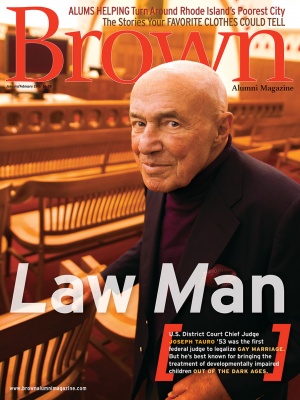David L. Marcus ’82 is schooled by Dana Goldstein ’06, author of The Teacher Wars: A History of America's Most Embattled Profession.

DM Your book made me see that the Common Core is just the latest effort to impose rigor. What do you like about the Common Core?
DG There is so much I like about it, especially the emphasis on rigorous reading across the curriculum and on thesis-driven writing backed by evidence. Those are the skills students need to be successful in college.
DM What don’t you like about it?
DG Where I'm more skeptical is the high-stakes standardized testing tied to the Common Core. These tests will be used to evaluate teachers and sometimes to shut down schools. And yet, when we look at the early versions of these exams, many of them are low-quality multiple-choice tests like the old tests they were supposed to improve upon, being created by the same old for-profit testing companies that are responsible for the low-quality exams tied to No Child Left Behind.
DM If you could advise school districts around the country and know they'd listen to you, what three things would you have them do to truly improve schools?
DG This is a tough question, which is why I end the book with eleven policy suggestions! We're always looking for a silver bullet in our education debate, and the truth is, there isn't one. Schools are complex organizations embedded within communities and political systems. So improving them is complex too.
DM What are the most pressing reforms you’d suggest?
DG One is revamping the school day so that teachers spend a little bit less time in front of students and more time collaborating with one another to create effective lesson plans and share best practices. We know many of our competitor school systems around the world have built much more collaborative professional cultures for teachers than we have here in the United States.
Secondly, principals matter as much as teachers. When top teachers are surveyed on what would inspire them to stay in the profession or move to a needier school, they answer that a respected, effective principal is the key draw. Principals must be proven instructional leaders, not just bureaucrats.
Third, racial and socioeconomic integration is associated with better academic outcomes. We need to do everything we can to reduce the number of schools that are segregated—where over 90 percent of the students are living in poverty. I've written a lot about how both housing and education policy can be employed to do this, without reigniting the busing wars of the 1970s.
DM On balance, do teacher unions make education better or hinder progress?
DG My book is a work of history, so let's look at the historical record. States with collective bargaining for teachers have larger education budgets, higher teacher pay, and higher student achievement. Teachers unions have long advocated for policies, like public pre-K, that truly benefit children and families.
DM But you’re not entirely sold on unions today?
DG I am frank in the book about which union protections I believe are outdated. I reject the idea that we can't distinguish between good and bad teaching, so I don't support "last in, first out" layoff policies that protect experienced teachers even if their performance is worse than that of younger teachers. Seniority should be a tiebreaker, not the only factor. We also need to look closely at teacher tenure. I believe in due-process rights for teachers and other workers, but in practice it has to be reasonably affordable and fast to remove an ineffective teacher from the classroom.
DM When I visit private schools, I often see innovation: teamwork, portfolios, classes held at museums, independent projects for seniors. When I visit public schools, I increasingly see test prep—for tests that apparently don't prepare kids for today’s jobs. Thoughts?
DG There are certainly public schools, even in high-poverty neighborhoods, that use all those strategies. I've visited some of them as a journalist. However, you're right to note the gap between what affluent parents choose for their own children and the dominant reforms policymakers have pushed on our public schools over the last several decades. Here's one hopeful finding from education research: Children whose teachers spend less time on standardized test prep and more time on high-level, conceptual, creative instruction, actually perform better on end-of-year standardized tests than those children whose teachers devoted a lot of time to drilling for those tests. Standardized test prep is not only stultifying, it's also completely counterproductive.
David L. Marcus is author of Acceptance: A Legendary Guidance Counselor Helps Seven Kids Find the Right Colleges—And Find Themselves.





